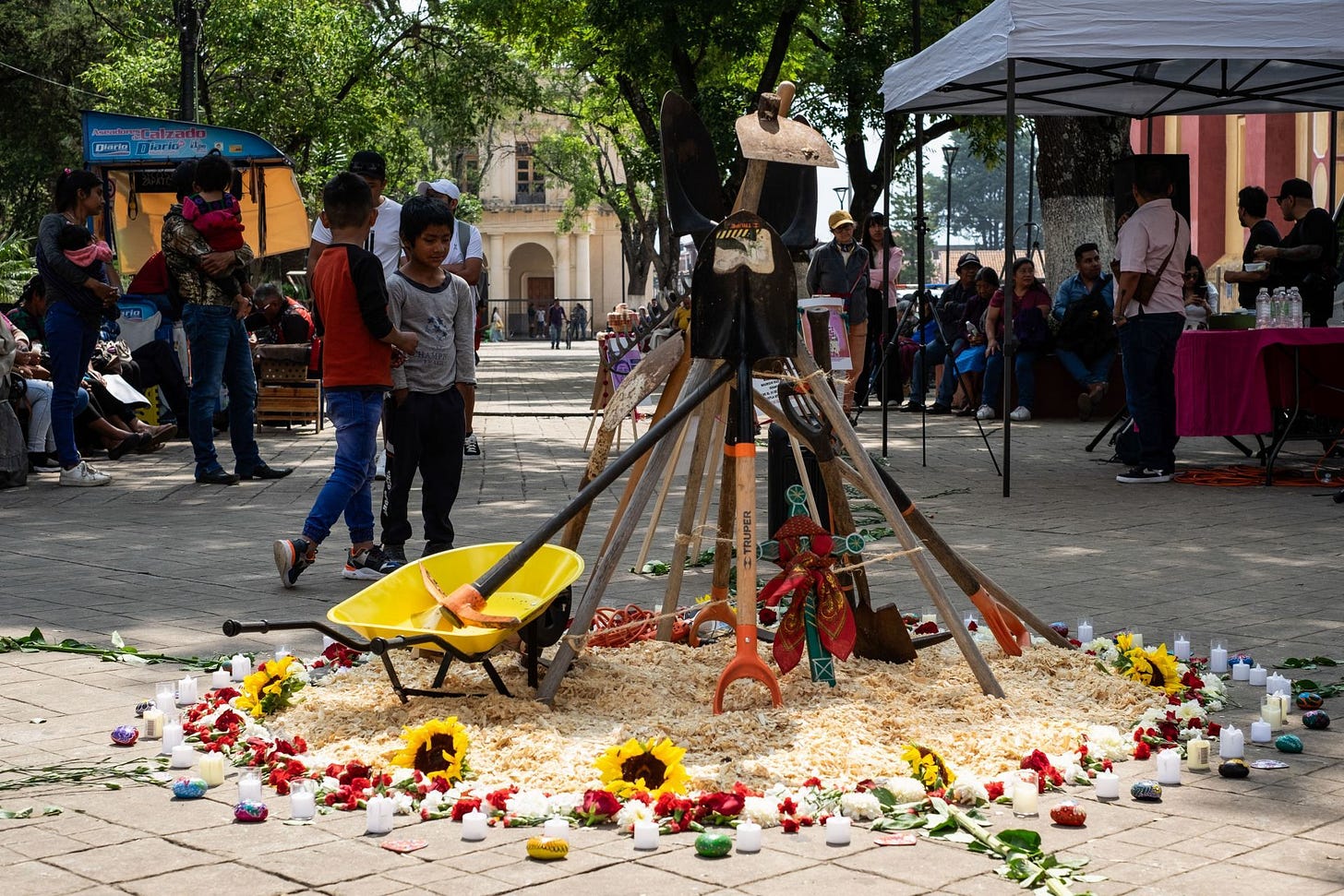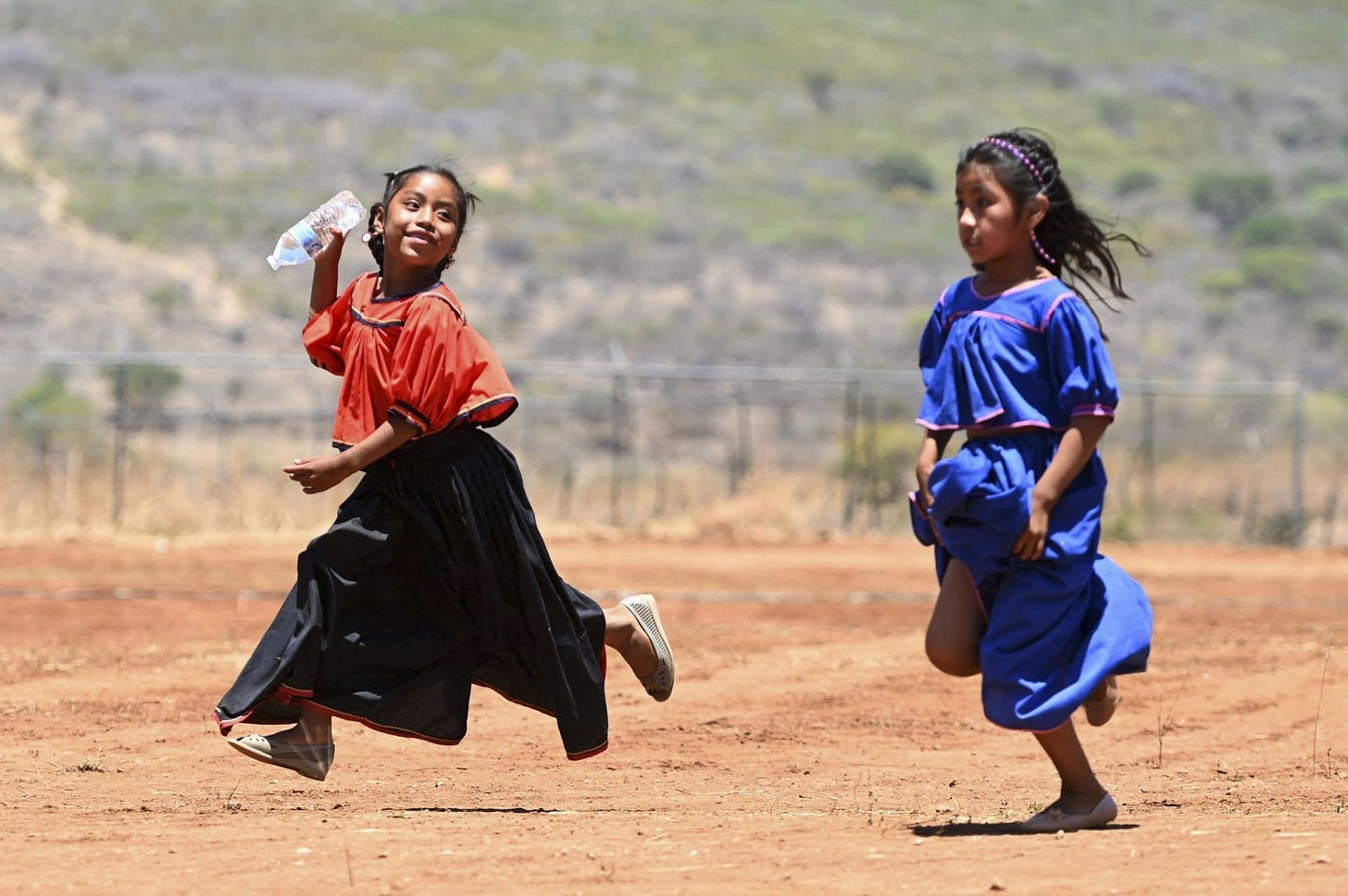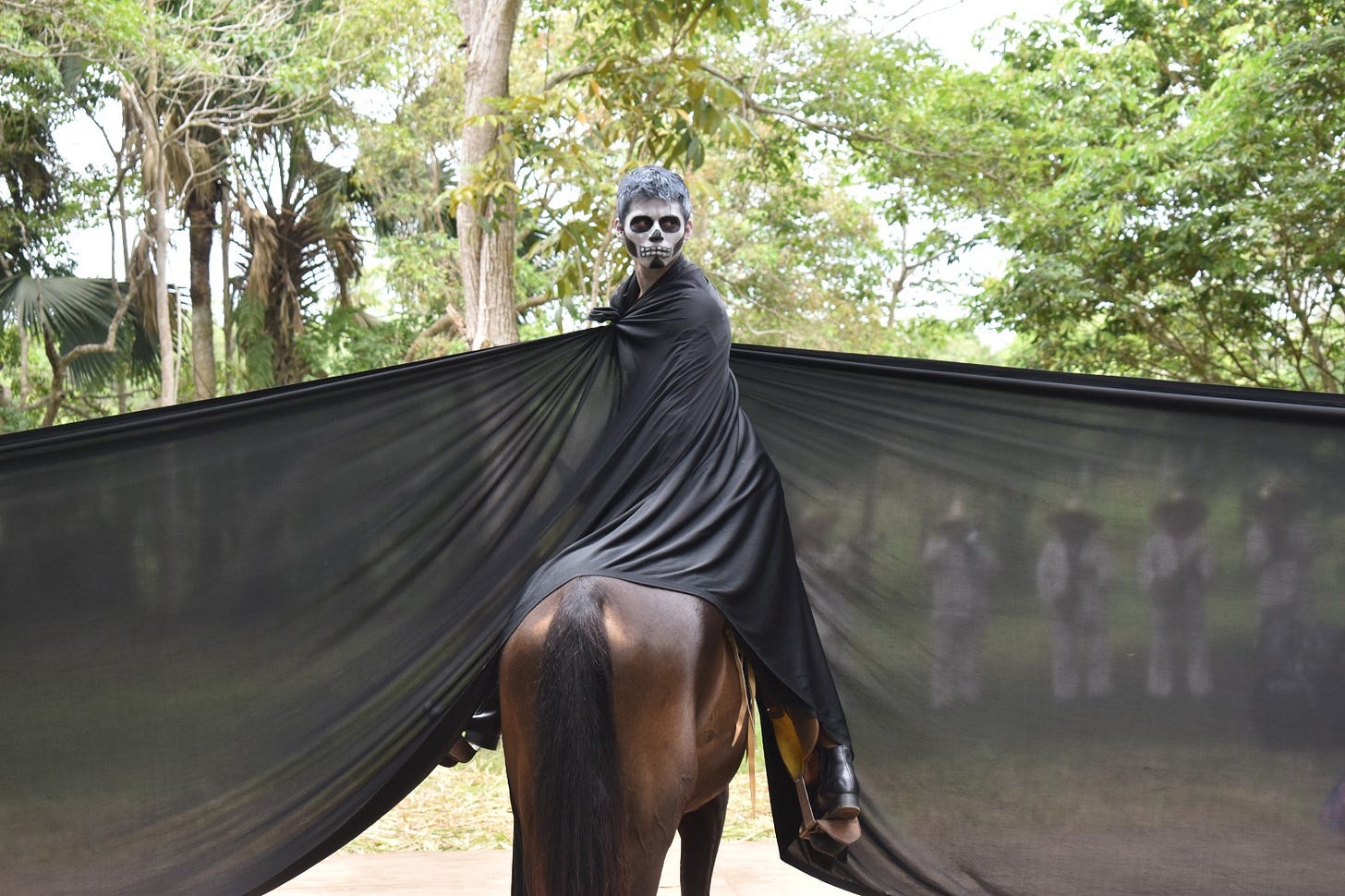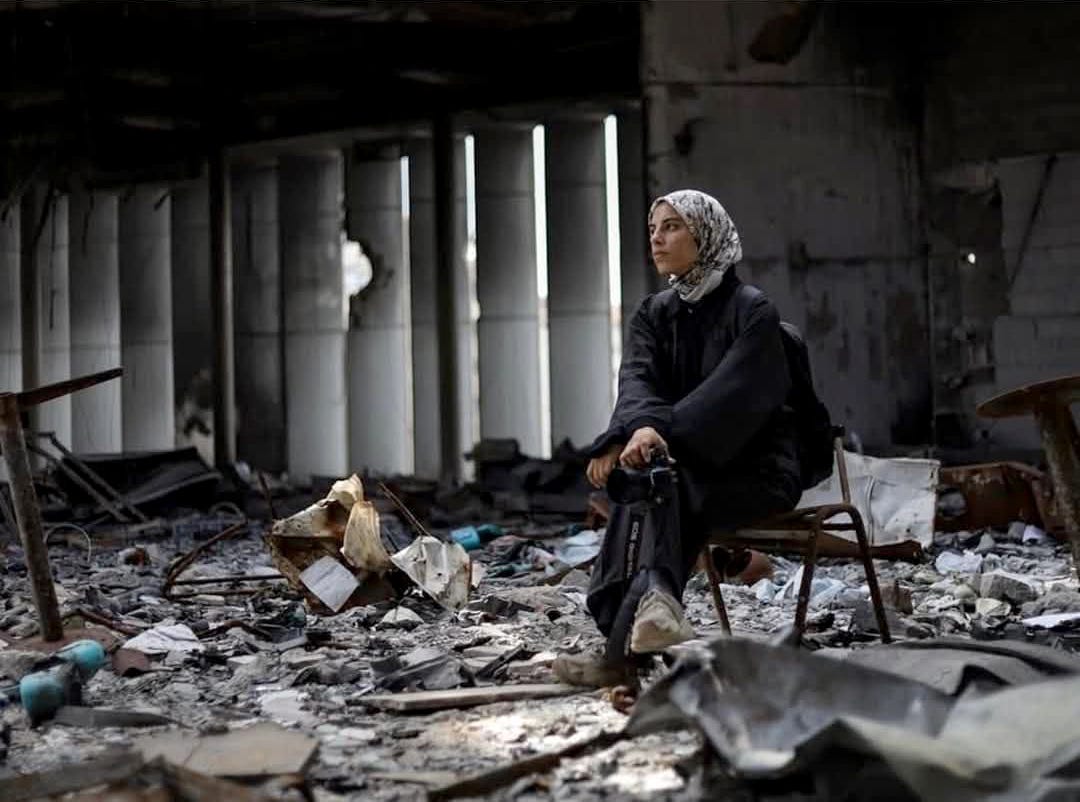16 May 25 | Hasta la madre (The Women Are Fed Up)
Also: José Mujica: from guerrilla fighter to president. Justice for the Wixárika people. Indigenous theater for social change. Artificial intelligence vs. collective handcrafted intelligence.
Lea La Jornada Internacional en español aquí.
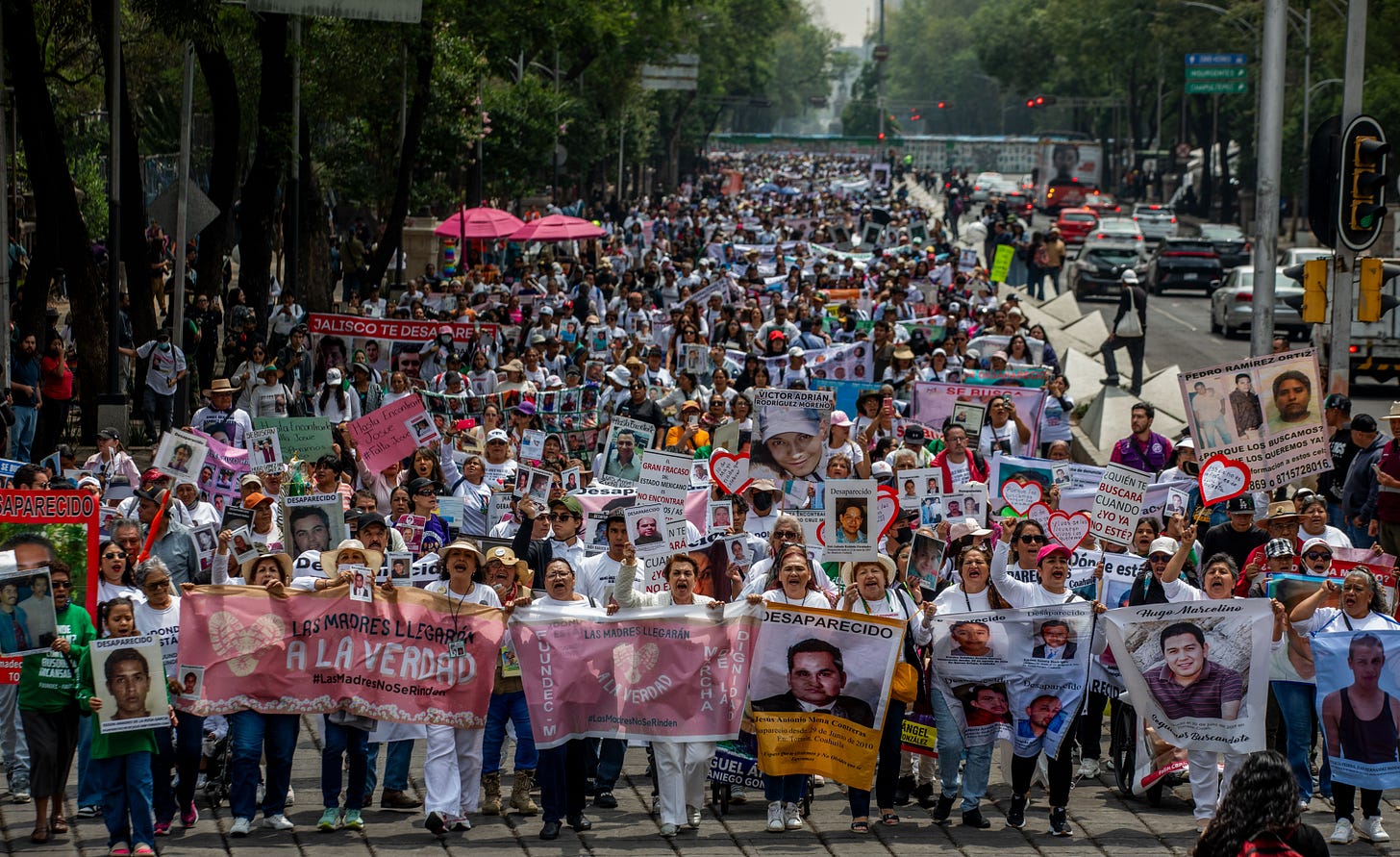
Mothers searching for the disappeared: The duty of justice
This Mother’s Day in Mexico, tens of thousands of women who don’t know where their sons, daughters, siblings, grandchildren, or spouses are, took to the streets to demand that the government use every available resource to find the more than 100,000 disappeared people and bring those responsible to justice.
“The best way to honor Mexican mothers is to mobilize all the resources of the state to find the disappeared, prosecute those responsible, and eradicate this crime that affects all of society,” La Jornada argues.
In a Mother’s Day editorial, La Jornada acknowledges there has been progress in how the government is addressing this national tragedy. It highlights the respectful treatment that these mothers searching for the disappeared have received from President Claudia Sheinbaum—unlike the threats of legal action and other penalties they received under the administration of Felipe Calderón, whose so-called “war on drugs” triggered the first major wave of disappearances.
Additionally, La Jornada reports that in the period between when Sheinbaum took office last October and this April, the daily number of homicides has dropped by 25 percent. The president has acknowledged the important role played by mothers searching for the disappeared, and sent a proposal for reform to Congress focused on enforced disappearances. She said the goal is to discuss and approve changes to the General Law on Enforced Disappearance in June.
While acknowledging the recent push by President Sheinbaum and the Interior Secretary to address the issue in their morning press briefings, the more than 90 collectives that make up the Movement for Our Disappeared in Mexico insist that that’s still not enough. For these mothers, their families, and many people in Mexico, there is “nothing to celebrate” on Mother’s Day.

“The tragedy of the Trujillo Herrera family is a stark example of the bloody toll of the drug war unleashed by former President Felipe Calderón,” wrote Blanche Petrich in a report for La Jornada. María Herrera gives a detailed account of state and federal investigations into the disappearances of her family members dating back to 2010, including cover-ups by the head of the ministerial police and the involvement of intermunicipal police, whom she accuses of handing two of her relatives over to drug traffickers. “Three presidential terms later, the practice of disappearances and the cover-up of perpetrators persists,” she told Petrich.
This experience has left Herrera deeply distrustful of what Sheinbaum’s government has been saying during recent meetings with families. “My impression is that rather than build on what’s already been done, they want to dismantle it. I have a feeling the same thing will happen as with the 43 students from Ayotzinapa. There was national and international outrage, and what happened? Where are they?” she asks.
After so many years of neglect, it will take months, if not years, to overcome the deep distrust of the mothers searching for the disappeared. After families of the disappeared protested in March against how a new disappearance law was being drafted, Sheinbaum announced that in May, revisions to the bill would be made with input from families and social organizations.
On this Mother’s Day, the mothers and other relatives of the disappeared made it clear they will not stop demanding accountability from the government, that all those responsible for enforced disappearances be brought to justice, and that steps be taken to ensure this does not happen to other families.
Lessons for Dealing with Disappearances in the United States?
Some experts in the U.S. are beginning to consider whether they may soon need the help and guidance of Latin America’s movements for the disappeared to address the policies of Donald Trump’s administration, which, among other things, includes what could be considered enforced disappearances of immigrants.
“Under the president’s direction, U.S. government agents have captured men, women, and children for detention and deportation without due process. For those of us who work in Latin America, the actions of Trump’s security forces are ringing an alarming bell,” stated the National Security Archive, which organized a forum on the issue. The strategies developed by Latin Americans to fight disappearances, they argue, may help inform the U.S. response.
The Quote
One of the disgraces of politics is having abandoned the field of philosophy and becoming merely an economic recipe book... It’s not that economics isn’t important, but humanity must someday ask itself: Where are we headed? What does the future hold? What is our responsibility toward life? Human life is almost a miracle in the vast mineral silence of the universe.
-José “Pepe” Mujica
In case you missed it
◻️ José Mujica: from guerrilla fighter to president. Mujica once said there were only “two paths: to radicalize deeply or to abandon one’s principles,” explained Stella Caloni. “We have to keep fighting for a kind of society where everyone works at something—not where people ride in the cart while others pull it, but also not where people live just to work and consume, but rather have time to spend on what they like.” Politicians in Mexico have also praised the former Uruguayan president. Mujica was and will continue to be a symbol and reference point for the Latin American left, writes La Jornada.
▶️ VIDEO: Mujica visited a migrant shelter in Tijuana in 2016 and served breakfast to the residents. GALLERY: José Mujica dies at age 89, "the world's poorest president."
◻️ More than 4 million people rose out of poverty in Mexico. Wage increases helped lift 4.1 million people out of poverty between 2018 and 2022, reported the Secretary of Labor and Social Welfare Marath Bolaños López.
▶️ VIDEO The "rescue" that robbed the poor and enriched the rich.
◻️ Justice for the Wixárika people after years of struggle. President Claudia Sheinbaum signed a decree in May returning a total of 5,956 hectares to the community of San Sebastián Teponahuaxtlán and its annex, Tuxpan, as part of the Wixárika People's Justice Plan. She also pledged to continue working toward official recognition of all sacred sites. Three years ago, residents from these communities organized a caravan to Mexico City to present their demands.
◻️ Indigenous theater for social, spiritual, and aesthetic change. María Alicia Martínez Medrano saw artistic expression as a tool for transformation and succeeded in bringing this initiative to historically marginalized communities, where it became a medium for social, spiritual, and aesthetic change.
◻️ Mexico supports USMCA and more trade with the U.S. President Claudia Sheinbaum said, “We hope it stays as it is, with minimal review or renegotiation,” as it has benefited the region. At the same time, Mexico will not close its doors to other partners, including China, Vietnam, Europe, and Brazil, said Finance Secretary Edgar Amador Zamora.
◻️ Cuba lives under permanent aggression. Deputy Foreign Minister Carlos Fernández de Cossío stated that U.S. policy toward the Cuban people is defined by economic coercion. He added, “The international community rejects the economic blockade, and it’s paradoxical that in the UN General Assembly, the only two countries that defend it are the ones that massively engage in terrorism: the United States and Israel. The situation of the Palestinians is the clearest example.” ▶️ VIDEO
◻️ Salt in the wound: remittance tax. Deportations, raids, asylum cancellations—and now a proposed 5% tax on remittances, introduced by U.S. lawmakers. The proposal sparked protests in Mexico. All political parties represented in the Mexican Senate voiced opposition, and Mexico’s ambassador to the U.S., Esteban Moctezuma, met with American lawmakers to argue against the possible tax.
◻️ Artificial intelligence vs. collective handcrafted intelligence, by Ramón Vera Herrera, in the Ojarasca supplement. In our imagination, in our memory, there are places that are moments in time, and times that are places. When paired with a cultivated, collective intelligence—handcrafted, in that sense—these spatial and temporal places are reproduced and gain more meaning and emotion. They become dense with the lives, moments, and stories involved. On the other hand, AI contains none of this—no place, no one, no presence.
◻️ Stars condemn Israeli killing of Palestinian photojournalist. Photojournalist Fatma Hassouna documented everyday life in the Gaza Strip through her lens since the start of the Israeli invasion, especially after the Israeli military banned foreign journalists from entering. In Cannes, more than 350 directors, producers, actresses, and actors signed a letter published on the first day of the Cannes Film Festival condemning Hassouna’s murder and demanding that silence not be allowed regarding the situation in Palestine.
🎥 What We’re Watching
Robert De Niro accepts the honorary Palme d’Or and calls for art to fight fascism.



